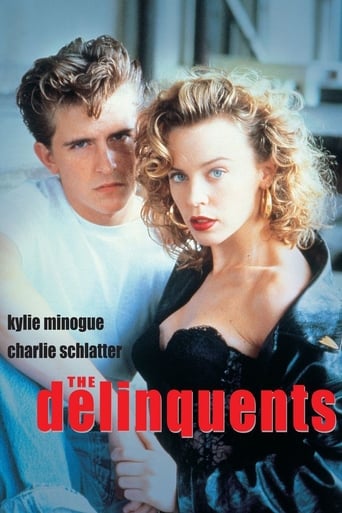James Hitchcock
Now that she is so well known as a pop star, it seems strange to think that Kylie Minogue was once better known as an actress; indeed, when her first hit "The Locomotion" came out it was dismissed as a soap star's attempt at a novelty record. "The Delinquents" was Kylie's first feature film, a teenage romance set in the Australia of the 1950s. The word "delinquent" normally means a criminal, often a teenage hooligan, but the young people shown in this film do not, at first sight, appear to fit that definition at all.Lola Lovell and Brownie Hansen are working-class teenagers from the small town of Bundaberg. Both are from difficult family backgrounds, having grown up without their fathers. Lola is the daughter of an unmarried mother; Brownie's parents are divorced. Lola's mother is, outwardly, a devout Catholic but inwardly a narrow-minded hypocrite. Brownie's mother is weak and can do nothing to protect him from his obnoxious stepfather Bert, a man who demands respect from Brownie and thinks he can compel it by administering vicious beatings. It is therefore hardly surprising that the youngsters, starved of affection, should fall madly in love. Lola becomes pregnant and they attempt to run away together, but this attempt is frustrated by their parents. Despite her Catholic principles, Lola's mother forces her to have an abortion (presumably legal in Australia at this period, when it was still illegal in Britain).The most interesting part of the film comes when Brownie does manage to leave home and finds a job as a merchant seaman. His father was an American sailor (was this detail added to explain away Charlie Schlatter's accent?), and Brownie's great ambition has always been to follow him in a career at sea. Lola also manages to escape from Bundaberg and makes her way to Sydney, where she and Brownie are reunited. For a time, it looks as though all will end happily, but their problems are just beginning.We Poms frequently look on Australia as a relaxed, tolerant society, but the country we see here is anything but. It was, of course, Australia which gave the word "wowser" (killjoy) to the English language, and according to an Australian friend of mine the word can refer not only to narrow-minded moralists but also to high-minded idealists who make it their business to mind everyone else's, in the interests of the greatest happiness of the greatest number. (One legend, unfortunately not supported by the compilers of dictionaries, has it that the word is an acronym for We Only Want Social Evils Removed). There are plenty of wowsers of this sort in the film.Brownie and Lola are arrested by the police and charged with "vagrancy". The film never explains exactly what the elements of this crime are under Australian law, but it would appear that it is sufficient to be young and short of money. (Under English law a person can only be convicted of vagrancy if they attempt to support themselves by begging, something which Brownie and Lola never do).Brownie is fined, but Lola, being under eighteen, is taken into care and forbidden to see Brownie again. This is presented not as a punishment but rather as being for her own good. "It's for your own good" is the watchword of every high-minded wowser, and one we hear a lot in this film. (It was, for example, for Lola's "own good" that she was forced to have an abortion). For Lola's own good she is sent to live with Auntie Westbury, a court-approved foster mother, and a first-class wowser in her own right. Auntie is played by Melissa Jaffer as Australia's most monstrous suburbanite since Edna Everage, an amusing caricature of the complacent, middle-aged middle-class square who disapproves of young people and all their ways, especially sex and rock music. When Lola rebels against Auntie's regime, she is sent to reform school. For her own good, of course. There is a subplot involving Lola's friends Lyle and Mavis, a married couple; when Mavis dies their young daughter is taken away from its father and put into care on the grounds that he is unemployed. (For which read: because he is poor, working-class and therefore unlikely, in the eyes of high-minded wowsers, to prove a good father).Most of the film rarely rises above the level of a sentimental soap opera in which Lola and Brownie are the idealised heroes and, with a few exceptions, the adults (anyone over twenty) the villains. Those exceptions are Lyle and Mavis and, to some extent, the ship's bosun who befriends Brownie, although even he has his blind spots; he advises Brownie not to get involved with Lola as romance might be an impediment to his seafaring career. There are no particularly memorable acting performances; on the basis of this film, Kylie was probably wise to concentrate on her singing rather than her acting. She is fine when portraying Lola as a sweet and innocent young thing, less so when her character turns truculent and rebellious under severe provocation from the System. The film is, however, worth watching for those scenes which provide an insight into fifties' Australia at its most reactionary. 6/10
Die beste Freundin
´The Delinquents´ was made just after Kylie´s rise to fame in the music business (thanks to producers Stock, Aitken and Waterman), and is a star vehicle in the tradition of the classic Hollywood movies starring (f.i.) Joan Crawford. Not the plot, but the actress comes in first place in these kind of movies. Every storyline, every camera angle, everything spins around miss Minogue. She gets all the time and space to show off her acting skills, good looks and various hairstyles. This movie would have been a disaster without the star quality Kylie brings to it. Even though she never made it to the level of Madonna or Janet Jackson, she has the attitude that goes with top stardom, and that is what makes her film debut really enjoyable.









